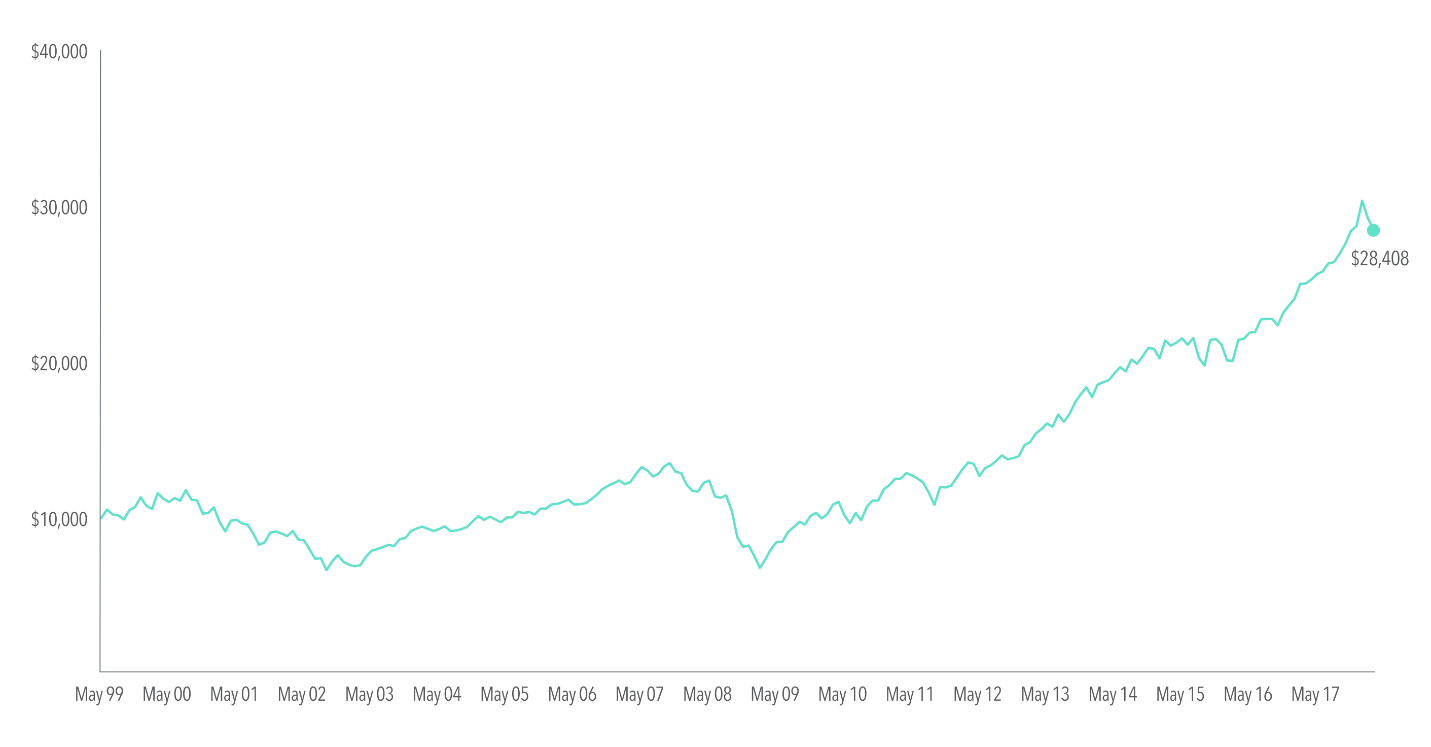[vc_row][vc_column][vc_column_text]
Tuning Out the Noise
Keeping your eye on the ball for long term investing[/vc_column_text][/vc_column][/vc_row][vc_row][vc_column width=”1/2″][vc_column_text]
For investors, it can be easy to feel overwhelmed by the relentless stream of news about markets. Being bombarded with data and headlines presented as impactful to your financial well-being can evoke strong emotional responses from even the most experienced investors. Headlines from the ”lost decade”1 can help illustrate several periods that may have led market participants to question their approach.[/vc_column_text][/vc_column][vc_column width=”1/2″][vc_video link=”https://youtu.be/Bi8IsjosU_g”][/vc_column][/vc_row][vc_row][vc_column][vc_column_text]
- May 1999 – Dow Jones Industrial Average Closes Above 11,000 for the First Time
- March 2000 – Nasdaq Stock Exchange Index Reaches an All‑Time High of 5,048
- April 2000 – In Less Than a Month, Nearly a Trillion Dollars of Stock Value Evaporates
- October 2002 – Nasdaq Hits a Bear-Market Low of 1,114
- September 2005 – Home Prices Post Record Gains
- September 2008 – Lehman Files for Bankruptcy, Merrill Is Sold
While these events are now a decade or more behind us, they can still serve as an important reminder for investors today. For many, feelings of elation or despair can accompany headlines like these. We should remember that markets can be volatile and recognize that, in the moment, doing nothing may feel paralyzing. Throughout these ups and downs, however, if one had hypothetically invested $10,000 in US stocks in May 1999 and stayed invested, that investment would be worth approximately $28,000 today.2
When faced with short-term noise, it is easy to lose sight of the potential long-term benefits of staying invested. While no one has a crystal ball, adopting a long-term perspective can help change how investors view market volatility and help them look beyond the headlines.
Hypothetical Growth of Wealth in the S&P 500 Index
May 1999–March 2018

Part of being able to avoid giving in to emotion during periods of uncertainty is having an appropriate asset allocation that is aligned with an investor’s willingness and ability to bear risk. It also helps to remember that if returns were guaranteed, you would not expect to earn a premium. Creating a portfolio investors are comfortable with, understanding that uncertainty is a part of investing, and sticking to a plan may ultimately lead to a better investment experience.
1For the US stock market, this is generally understood as the period inclusive of 1999–2009.
2As measured by the S&P 500 Index. A hypothetical portfolio of $10,000 invested on April 30, 1999, and tracking the S&P 500 Index, would have grown to $28,408 on March 31, 2018. However, performance of a hypothetical investment does not reflect transaction costs, taxes, or returns that any investor actually attained and may not reflect the true costs, including management fees, of an actual portfolio. Changes in any assumption may have a material impact on the hypothetical returns presented. It is not possible to invest directly in an index.
Disclosure: Please remember that past performance may not be indicative of future results. Different types of investments involve varying degrees of risk, and there can be no assurance that the future performance of any specific investment, investment strategy, or product (including the investments and/or investment strategies recommended or undertaken by Versant Capital Management, Inc.), or any non-investment related content, made reference to directly or indirectly in this article will be profitable, equal any corresponding indicated historical performance level(s), be suitable for your portfolio or individual situation, or prove successful. Due to various factors, including changing market conditions and/or applicable laws, the content may no longer be reflective of current opinions or positions. Moreover, you should not assume that any discussion or information contained in this article serves as the receipt of, or as a substitute for, personalized investment advice from Versant Capital Management, Inc. To the extent that a reader has any questions regarding the applicability of any specific issue discussed above to his/her individual situation, he/she is encouraged to consult with the professional advisor of his/her choosing. Versant Capital Management, Inc. is neither a law firm nor a certified public accounting firm and no portion of the article content should be construed as legal or accounting advice. If you are a Versant Capital Management, Inc. client, please remember to contact Versant Capital Management, Inc., in writing, if there are any changes in your personal/financial situation or investment objectives for the purpose of reviewing/evaluating/revising our previous recommendations and/or services. A copy of the Versant Capital Management, Inc.’s current written disclosure statement discussing our advisory services and fees is available upon request.[/vc_column_text][/vc_column][/vc_row]
